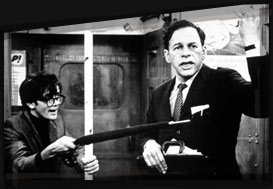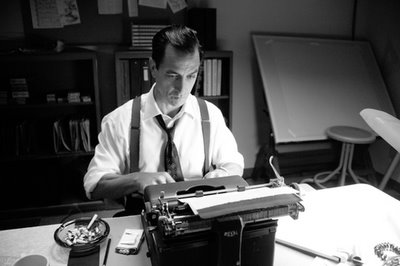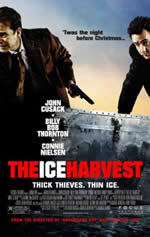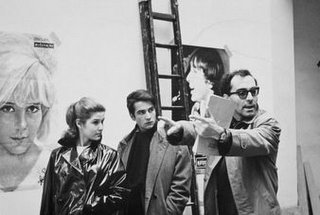Wednesday, December 28, 2005
Monday, December 26, 2005
What C. Wright Mills Already Knew: Syriana
 Turns out, power is something worth discussing, even if you thought Who Governs? explained that troublesome bogeyman away. Get out your Gramsci, Fanon, Reuther, Niebuhr, Foucault, Said and Anderson, put on a pot of coffee and theorize Blackwater, Bechtel, Halliburton and The Carlyle Group. As an incipient, lacksadaisical political scientist, I'd say the film lacked an additional layer of complexity and subtlety by missing the role played by NGO's and nonprofit corporations mining a lucrative third way. Why bother with shadowy front operations when the money can be funneled back and forth between well-meaning third parties?
Turns out, power is something worth discussing, even if you thought Who Governs? explained that troublesome bogeyman away. Get out your Gramsci, Fanon, Reuther, Niebuhr, Foucault, Said and Anderson, put on a pot of coffee and theorize Blackwater, Bechtel, Halliburton and The Carlyle Group. As an incipient, lacksadaisical political scientist, I'd say the film lacked an additional layer of complexity and subtlety by missing the role played by NGO's and nonprofit corporations mining a lucrative third way. Why bother with shadowy front operations when the money can be funneled back and forth between well-meaning third parties?From a moviegoing perspective, Syriana does things that confuses Americans (read: non-ideological thinkers) by violating certain principles of fairness which automatically subverts the exoticist rampage storyline. This is Melville and Conrad territory, albeit less poetic, suspended in a value neutral vacuum. This is beyond good and evil; these are tactical losses and collateral damage, tit for tat. Finally a metaphor for the movements of portfolio capital, embodied in the several persons animating the drama.
Unlike Moore, Gaghan and Clooney (channeling something he must have learned under David O. Russell) conspire to create a nearly unimpeachable political film, so restrained it can't be considered exciting or suspenseful or any of the Oscar-worthy blurb cliches that will doubtless be imputed to it. Syriana refutes Soderbergh's hamfisted lecture on the war on drugs and complicates matters by presenting a story in which allegiances change, lessons are learned and time overlaps, rather than evolving from one point through an arc, creating a story rife with coincidence and stinking with serendipity. Unlike the revelations of Medium Cool, Syriana's message breaks across faces with the same grim realization undergone by the executioner in Kafka's In the Penal Colony, not out of enlightenment, but painful necessity.
Tuesday, December 20, 2005
Let's Play Get the Guests: The Incident
 Who's Afraid of Virginia Woolf? The Incident unravels like an Albee-an nightmare, as if his stuff weren't nightmarish enough. From the moment the film begins, the characters pouring in to their own Manhattan Transfer, each with a tiny narrative of their own, we get a grandiose prisoner's dilemma (or collective action problem) in which we see the worst of humanity in acts of high cowardice. This is the stuff of the real Calvin and Hobbes.
Who's Afraid of Virginia Woolf? The Incident unravels like an Albee-an nightmare, as if his stuff weren't nightmarish enough. From the moment the film begins, the characters pouring in to their own Manhattan Transfer, each with a tiny narrative of their own, we get a grandiose prisoner's dilemma (or collective action problem) in which we see the worst of humanity in acts of high cowardice. This is the stuff of the real Calvin and Hobbes.The Incident pits randomly selected individuals against two menacing hooligans. The hostages come from all walks of life and somehow the criminals suss something about each individual that paralyzes the others with fear. It's a vulgar Freudian nightmare at cross purposes with Darwin - sexuality and power are in the fore and these wounded animals can't defend themselves adequately, leaving the cats to play with the mice before they kill them.
It's a powerful film. Deeply naturalistic, this is McTeague without the money; the criminals have figuratively chained themselves to the car, at once putting them in a position of strength and weakness. Spectacularly cruel, The Incident seems like an answer to Elia Kazan's so-called do-gooder politics, Peerce thumbing his nose at those who believe collective action to be inherently red, or inherently anything. Equally interesting is that this film could be remade, set in the eighties, before any notion of "quality of life" crime and other police vocabulary had yet to be created and the legendary, pre-Giuliani New York that was mythologized as the province of junkie warlords and gangbangers, open to the promise of a police state.
Thursday, December 15, 2005
Stranger than Fiction: Good Night, And Good Luck.
 A film that proved fresh and exciting because it feels like fiction. As Anderson Cooper skulks in the desert, dragging the Vanderbilt fortune behind him somehow plays like cinema verite. With the post-Network era of infotainment so engrained in our epistemic reflex that local and national no longer registers as inane and asinine commentary or pleasant fictions more likely opposite the truth, ushering in a reality reduced to simulacra: the shared experiences remembered through bizarre anecdotes of cultural memory littering our psyche with the sort of useless knowledge helpful solely for Quizzo and Google searches. We've reached a societal disconnect that transgresses escapism and blunders fecklessly past citizenship into the new, weird Americana that represents the country's international reputation.
A film that proved fresh and exciting because it feels like fiction. As Anderson Cooper skulks in the desert, dragging the Vanderbilt fortune behind him somehow plays like cinema verite. With the post-Network era of infotainment so engrained in our epistemic reflex that local and national no longer registers as inane and asinine commentary or pleasant fictions more likely opposite the truth, ushering in a reality reduced to simulacra: the shared experiences remembered through bizarre anecdotes of cultural memory littering our psyche with the sort of useless knowledge helpful solely for Quizzo and Google searches. We've reached a societal disconnect that transgresses escapism and blunders fecklessly past citizenship into the new, weird Americana that represents the country's international reputation.But Good Night and Good Luck doesn't say that, nor does it preach to its audience. Unlike Network, a film that presaged the era of soft news, Good Night and Good Luck comes across as a rote history with no catchphrase to speak of or even cartharsis. In fact, history is presented as it ought to be: an unfolding process, not some triumphal arc replete with the pompous class president speeches leading to easy, ludicrous conclusions. More importantly there is no point in nostalgia; the direct continuum past to present, from McCarthy and Hoover, to COINTELPRO and Hoover, to Ashcroft, Gonzalez and the PATRIOT chorus, there's nothing worth rhapsodizing. Analytically speaking, this is the stuff of a Benjamin aphorism.
David Straithairn's Murrow is breathlessly reserved, forthright and filled with conviction. Opposite him, Clooney plays his equally cool producer, the aptly named Fred Friendly, Clooney being careful to write himself out of St. Peter status as Jesus' footman. The remaining cast offer lovely supporting performances, Jeff Daniels perhaps foremost among them as the stern but fair management man and secret couple Joe and Shirley Wershba playing the skeptics with something to lose.
Good Night, and Good Luck. succeeds among biopics for its restraint; at under 90 minutes there's no time for meandering flashbacks that place characters in irrelevant context. The film is present to itself and its subject and leaves out the messianic qualities for which is hagiography's renown. A film so lavishly produced, shot in gorgeous black and white to remind audiences that this isn't some science fiction, gives historic weight and Dianne Reeves plays a jazz singer whose interstitial performances are as much evidence of television's Golden Age as they are the choruses corresponding to each scene in turn.
With message films being the order of the day and so few delivering on their promises, Clooney exceeds expectations. Unlike his predecessor Robert Redford and mentor Steven Soderbergh, Clooney as a writer and director undoes all the things that made HBO's K Street so unbearable. By avoiding cant and cliche and presenting a realistic portrait of an important, but minor historical figure, Clooney has a faith and optimism that perhaps more likeminded people lack. As politicians struggle to define their legacies and shore up support for upcoming elections, films like this one are like quiet cautionary tales instead of morality plays and dumb shows pantomiming to the choir.
Sunday, December 11, 2005
What's The Matter With Kansas: The Ice Harvest
 This perverse Dickensian tale has the makings of a modern day Christmas classic: a morality play gone awry in almost too many ways to count, with a Scrooge who realizes that even if he's generous, the bank account's still full. There's Christmas past, present and future, all rolled into one icy rainstorm as a Benz whisks Cusack from tense to tense.
This perverse Dickensian tale has the makings of a modern day Christmas classic: a morality play gone awry in almost too many ways to count, with a Scrooge who realizes that even if he's generous, the bank account's still full. There's Christmas past, present and future, all rolled into one icy rainstorm as a Benz whisks Cusack from tense to tense.If it sounds like another maudlin Christmas movie to you and if you've had enough of The Christmas Story to last a lifetime, consider this: Cusack plays a mob lawyer involved in a "perfect crime," partnered with Billy Bob Thornton as the muscle guy with motivation. Set in Kansas, we're made aware of the contradictions at play; you can almost hear Sen. Brownback chiding his congregation, ahem, constituency against the evils portrayed herein. This is the other Kansas - one that was left behind as rock 'n' roll moved out of Kansas City for Detroit, New York and Los Angeles. The political ambiguity still allows for a critique of greed and hypocrisy, something Daniel Kasman notes in his review.
Ramis returns to a familiar theme: small town claustrophobia. But unlike Groundhog Day, the danger in Wichita Falls is as palpable as it is inevitable. As Cusack skirts the cops and his would-be killer, we learn how desperate everyone is to escape; think of a thousand toasters dropped into a thousand bathtubs in the name of existential freedom. But for Cusack and his company, there are no easy outs.
If The Pardoner's Tale were a Christmas comedy or Groundhog Day a noir soaked in rain and bourbon, then The Ice Harvest would be a brown paper bag waiting for you Christmas morning beneath the tree, decorated with blood red ribbon.
Saturday, December 10, 2005
How to Disappear Completely, Vol. 3: Mr. Arkadin Returns!
 This is more than just good news. As I wrote here, this is a promising film, but as usual Laserlight couldn't have done any worse with handling and presenting it. I have some details regarding the forthcoming Criterion release, but they're unfortunately not at my immediate disposal. Actually, they're already published!
This is more than just good news. As I wrote here, this is a promising film, but as usual Laserlight couldn't have done any worse with handling and presenting it. I have some details regarding the forthcoming Criterion release, but they're unfortunately not at my immediate disposal. Actually, they're already published!
Rare and Out of Print: 24 lies per second
Something that gets lost in a lot of the conversation regarding repertory films being reissued on DVD is not just how idiosyncratic the process is, but how motivated it is by profit. 24 lies per second points up just how many interesting films get lost in the mix. Some of these may eventually find their way into broad re-release, but not without efforts like these that go a long way to develop a consciousness of what's out there waiting to be re-released.
The desperate thing about a wonderful site like 24 lies is how it makes me wish that everything were available, all at once. Of course, I'm taking a quick lunch break from The Man Who Fell to Earth and maybe I'm taking Newton/Sussex's "multi-tasking" a bit far.
*Obsessive's edit: Fortunately for me, my employer maintained a VHS copy of the film currently featured, The Incident, starring Beau Bridges and Martin Sheen.
The desperate thing about a wonderful site like 24 lies is how it makes me wish that everything were available, all at once. Of course, I'm taking a quick lunch break from The Man Who Fell to Earth and maybe I'm taking Newton/Sussex's "multi-tasking" a bit far.
*Obsessive's edit: Fortunately for me, my employer maintained a VHS copy of the film currently featured, The Incident, starring Beau Bridges and Martin Sheen.
Public Notice - Self-Styled Siren, Flickhead, Coffee & Cinemarati
 We're flattered. If you're not already reading Self-Styled Siren, Flickhead, Coffee, Coffee and more Coffee and Filmbrain on a semi-regular basis, well, you should be. Add to that list the impressive Cinemarati community, where Siren and Filmbrain began contributing recently. Updated links accordingly to right.
We're flattered. If you're not already reading Self-Styled Siren, Flickhead, Coffee, Coffee and more Coffee and Filmbrain on a semi-regular basis, well, you should be. Add to that list the impressive Cinemarati community, where Siren and Filmbrain began contributing recently. Updated links accordingly to right.With good images and fine commentary, film blogs tend to outweigh music blogs in terms of information and critical heft, contrary to what mainstream critics would have you believe. There's a, dare I say, lingua franca among film critics that doesn't exist in music criticism; the canon is embraced in an entirely different way, although I may be too charitable there. As an auto-didact who's got but nary three years experience with cinema, I have to believe that there's room for us amateurs too. A video clerk's sense of auteur theory, combined with a democratic familiarity with being surrounded by movies, imparts considerable humility when it comes to the expansive catalogue of titles now available on DVD.
As an addendum, I hasten to add that Cinemarati is a site like Daily Kos, except with an aesthetic compass. I can think of few more interesting internet "communities" that actually further critique through recursive processes. This comes as no surprise as they are serious about maintaining their structural integrity: they have by-laws!
Peter Nellhaus at Coffee Coffee, etc. recently looked at Fukasaku's Street Mobster which I saw about a month ago. What I don't understand about Fukasaku was his shift from remarkably realistic crime/yakuza epics to the gory romances of his later movies, exemplifed by Battle Royale. I can see that he might have exhausted the yakuza genre and would want to move on, but films like Battle Royale, while amazingly entertaining for their suspense and bloodlust, really lack Fukasaku's real talent as a storyteller willing to work within the constraints of historical reality.
Wednesday, December 07, 2005
Wild Love - Masculin féminin
 Masculin féminin has something for everyone. Not only is it for me the apex of Godard's romantic comedies, it's also the subtlest of his political films; there are no outlandish, unrealistic monologues delivered in political argot, nor are there any Truffautian paeans to love. Both of those things may be wonderful, but this is May '68 in '66; France's post-colonial agitation had begun and what's most refreshing (is that the right word?) is that there's no hint of isolationist rhetoric or warped Wilsonian internationalism. Godard's joie de vivre illuminates both political conviction and carefree love in ways that few films have before or since.
Masculin féminin has something for everyone. Not only is it for me the apex of Godard's romantic comedies, it's also the subtlest of his political films; there are no outlandish, unrealistic monologues delivered in political argot, nor are there any Truffautian paeans to love. Both of those things may be wonderful, but this is May '68 in '66; France's post-colonial agitation had begun and what's most refreshing (is that the right word?) is that there's no hint of isolationist rhetoric or warped Wilsonian internationalism. Godard's joie de vivre illuminates both political conviction and carefree love in ways that few films have before or since.By borrowing General Doinel from Truffaut, Godard captures Leaud the libertine at his peak. Vulnerable and virile, Leaud plays with the expectations of youth and how they sabotage them, from whimiscal allegiances to acts of idiosyncratic defiance. In six short years, Godard would come out the other side as a hard-bitten, disillusioned Marxist, upset with the failures of the movement and its token gestures toward rebellion and revolution in Tout Va Bien.
That maturation and wide-eyed understanding are the elements that make Godard's political love stories so believable; in many ways these works are novelizations of serious documentaries and other works of non-fiction, retold in a style that takes into account humanity and sexuality. The encumbered complexities are what is often forgotten in Leftist politics, even though everyone from Bernardo Bertolucci to Todd Gitlin understood the importance of sex in its relationship to anti-fascist politics including feminism as elements of a holistic view of humanism, leaving the sexless stereotypes to the Americanized, sanitized Second Wave and its middle-class mannerisms and cult of the individual essentialisms. Godard's problematic, contradictory impulses make for a more interesting film that is as much a document about the time as it is a story of it.
It's a Wonderful Life - Woody Allen's Early Years
 There's probably no more overlooked figure in my knowledge of film than Woody Allen. He's always been on my radar; I saw Sleeper as a pre-teen and knew immediately that his was a sense of humor and a sensibility I could automatically appreciate. Annie Hall too. Maybe I thought that said too much about me, but this could be some Carly Simon psychobabble about overwraught, intellectual narcissicists.
There's probably no more overlooked figure in my knowledge of film than Woody Allen. He's always been on my radar; I saw Sleeper as a pre-teen and knew immediately that his was a sense of humor and a sensibility I could automatically appreciate. Annie Hall too. Maybe I thought that said too much about me, but this could be some Carly Simon psychobabble about overwraught, intellectual narcissicists.So it was after seeing Manhattan that I completely fell in love with Allen as a filmmaker. I can think of few examples where someone can not only tell a beautiful story in such a self-contained, self-absorbed manner. And it's educational! Allen keeps no secrets about his influences and his films always point to cinematic history. His appreciation for Bergman in Manhattan is not only a metaphor but also a compliment.
In fact, it's to Allen's credit that he can so lightheartedly present audiences with film lectures while telling a story at the same time. It's good because there has to be some way for moviegoers who aren't neurotic, self-loathing Jewish New Yorkers to identify with his characters. Those caricatures are what people find funny - these reified distortions sometimes look like cartoons not people and not monsters - making it easier to come to grips with the story itself, which might be painful in ways that hit too close to home.
This has led me to buy Woody Allen Collection Vol. 1 and digest it immediately. For 49 bucks it seemed too good to pass up.
Monday, December 05, 2005
Price, Yeah!
If you were wondering how much you should've paid, check here. Not only do they compile prices, they include whatever specials are running on the sites listed. It's like Campusi for DVDs!
Friday, December 02, 2005
The Passenger
 This film not only has a cosmology, it poses a potent ontological dilemma. Again, issues of identity, being and time and being and nothingness are presented against a barren backdrop that offers no answers, only questions: a Gaudi rooftop reveals a rabbithole that delves into Deep Meaning. Soon it can all be yours (Via DVDBeaver)!
This film not only has a cosmology, it poses a potent ontological dilemma. Again, issues of identity, being and time and being and nothingness are presented against a barren backdrop that offers no answers, only questions: a Gaudi rooftop reveals a rabbithole that delves into Deep Meaning. Soon it can all be yours (Via DVDBeaver)!Send more Rossellini!

